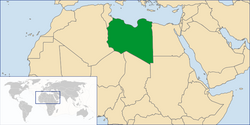Libya
From Roach Busters
| Line 91: | Line 91: | ||
|} | |} | ||
| - | '''Libya''' (Arabic: '''ليبيا''' Lībiyā; Libyan vernacular: Lībya), officially the '''People's Republic of Libya''' (Arabic: جمهورية ليبيا الشعبية | + | '''Libya''' (Arabic: '''ليبيا''' Lībiyā; Libyan vernacular: Lībya), officially the '''People's Republic of Libya''' (Arabic: جمهورية ليبيا الشعبية Al-Jamāhīriyyah al-Lībiyyah aš-Ša`biyyah), is a country in North Africa. Bordering the Mediterranean Sea to the north, Libya lies between Egypt to the east, Sudan to the southeast, Chad and Niger to the south, and Algeria and Tunisia to the west. With an area of almost 1.8 million square kilometres (700,000 sq mi), 90% of which is desert, Libya is the fourth largest country in Africa by area. The capital, Tripoli, is home to 1.7 million of Libya's 5.7 million people. The three traditional parts of the country are Tripolitania, the Fezzan and Cyrenaica. |
| - | + | ||
| + | The name "Libya" is a indigenous (i.e. Berber) one, which is attested in ancient Egyptian texts as [[Image:Rebu.jpg|100px]], R'bw (= ''Libu''), which refers to one the tribes of Berber peoples living west of the Nile. In Greek the tribesmen was called Libyes and their country became "Libya", although in ancient Greece the term had a broader meaning, encompassing all of North Africa west of Egypt. Later on, at the time of Ibn Khaldun, the same big tribe was known as ''Lawata''. | ||
[[Category:Nations]] | [[Category:Nations]] | ||
Revision as of 05:53, 5 March 2008
| جمهورية ليبيا الشعبية Al-Jamāhīriyyah al-Lībiyyah aš-Ša`biyyah People's Republic of Libya | |
| | |
 | 
|
| Flag | Coat of arms |
| | |
| Motto "al-Watan, at-Thawra, al-Wehda" (Arabic) "Nation, Revolution, Unity" | |
| | |
| Anthem The Internationale | |
| | |

| |
| | |
| Capital (and largest city) | Tripoli 32°54′N, 13°11′E |
| | |
| Official languages | Arabic |
| | |
| Demonym | Libyan |
| | |
| Government - General-Secretary - Premier - Politburo President | Socialist state Muammar al-Gaddafi Baghdadi Mahmudi Miftah Muhammed K'eba |
| | |
| Establishment - Relinquished by Italy - Independence - Coup d'état | February 10, 1947 December 24, 1951 September 1, 1969 |
| | |
| Area - Total - Water (%) | 1,759,540 km² 679,359 sq mi negligible |
| | |
| Population - July 2007 estimate - 2006 census - Density | 6,036,914 5,670,688 3.2 /km² 8.4 /sq mi |
| | |
| GDP (PPP) - Total - Per capita | 2007 estimate $59.31 billion $9,825 |
| | |
| GDP (nominal) - Total - Per capita | 2007 estimate $55.83 billion $9,248 |
| | |
| Gini (2000) | 25 (low) |
| | |
| HDI (2005) | |
| | |
| Currency | Dinar (LYD)
|
| | |
| Time zone - Summer (DST) | EET (UTC +2) not observed (UTC +2) |
| | |
| Internet TLD | .ly |
| | |
| Calling code | +218 |
Libya (Arabic: ليبيا Lībiyā; Libyan vernacular: Lībya), officially the People's Republic of Libya (Arabic: جمهورية ليبيا الشعبية Al-Jamāhīriyyah al-Lībiyyah aš-Ša`biyyah), is a country in North Africa. Bordering the Mediterranean Sea to the north, Libya lies between Egypt to the east, Sudan to the southeast, Chad and Niger to the south, and Algeria and Tunisia to the west. With an area of almost 1.8 million square kilometres (700,000 sq mi), 90% of which is desert, Libya is the fourth largest country in Africa by area. The capital, Tripoli, is home to 1.7 million of Libya's 5.7 million people. The three traditional parts of the country are Tripolitania, the Fezzan and Cyrenaica.
The name "Libya" is a indigenous (i.e. Berber) one, which is attested in ancient Egyptian texts as ![]() , R'bw (= Libu), which refers to one the tribes of Berber peoples living west of the Nile. In Greek the tribesmen was called Libyes and their country became "Libya", although in ancient Greece the term had a broader meaning, encompassing all of North Africa west of Egypt. Later on, at the time of Ibn Khaldun, the same big tribe was known as Lawata.
, R'bw (= Libu), which refers to one the tribes of Berber peoples living west of the Nile. In Greek the tribesmen was called Libyes and their country became "Libya", although in ancient Greece the term had a broader meaning, encompassing all of North Africa west of Egypt. Later on, at the time of Ibn Khaldun, the same big tribe was known as Lawata.
